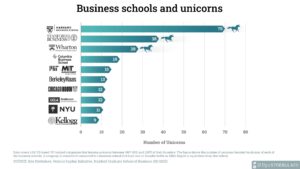Deciding whether to pursue an MBA (Master of Business Administration) or an EMBA (Executive Master of Business Administration) is one of the most important decisions you need to make if you are considering an MBA.
Both programs offer distinct benefits that cater to different professional stages, goals, and experiences and choosing the right option can be critical to your learning experience and outcomes.
Choosing the right option depends on various factors, such as your work experience, career objectives, time commitment, and financial investment. Below is a detailed comparison of the two programs to help decide.
1. Career Stage and Experience
The primary difference between an MBA and an EMBA lies in the target audience.
- MBA: An MBA program is typically aimed at professionals with 2-5 years of work experience who are looking to enhance their business skills and accelerate their careers. Many MBA candidates are either early in their careers or in the process of switching industries. An MBA offers a broad foundation in business topics, such as finance, marketing, operations, and management, and prepares candidates for leadership roles.
- EMBA: An EMBA, on the other hand, is designed for mid- to senior-level executives with 10-15 years of work experience. The program focuses on advanced leadership, strategic thinking, and decision-making skills that executives need to succeed at the highest levels of management. If you’re already established in your career and seeking to further sharpen your leadership abilities or pivot to a higher role, the EMBA might be a better fit.
2. Program Structure and Format
Another key difference is the structure of the two programs.
- MBA: MBA programs generally offer more flexibility. They can be pursued full-time, part-time, or online, and typically take 1-2 years to complete. Full-time MBA students often take a career break to immerse themselves fully in their studies, internships, and networking opportunities. Part-time and online MBAs allow professionals to continue working while studying, but the program can take longer to complete. Full-time MBA students can expect a comprehensive learning experience, including internships and significant networking opportunities.
- EMBA: EMBA programs are designed specifically for working professionals who want to continue working while they study. Classes are typically held on weekends, evenings, or in intensive blocks, allowing students to apply what they learn immediately in their jobs. An EMBA can be completed in 18-24 months, and the cohort format encourages networking and learning from fellow executives across various industries. This program is ideal for those who cannot afford to take a break from their careers but still want to advance their education.
3. Curriculum Focus
- MBA: The MBA curriculum covers a broad spectrum of business disciplines. The first part of the program typically includes core courses in accounting, economics, strategy, and leadership, while the second half allows students to specialize in areas like finance, marketing, entrepreneurship, or consulting. For younger professionals looking to build a strong business foundation and explore specific areas of interest, the MBA’s diverse curriculum offers significant flexibility.
- EMBA: While the EMBA program covers many of the same foundational business topics, the content is often more tailored to strategic management, leadership, and high-level decision-making. EMBA programs focus more on case studies, real-world business problems, and collaborative learning among experienced professionals. The curriculum is designed to help students enhance their leadership skills and develop a more global, strategic perspective.
4. Networking and Peer Learning
Both MBA and EMBA programs offer significant networking opportunities, but the scope and nature of these networks differ.
- MBA: MBA programs often include a more diverse cohort, with students from various industries and different levels of experience. The networking opportunities are broad, including fellow students, faculty, and alumni. If you are looking to build connections across industries and functions, an MBA might provide a wider range of contacts. Moreover, full-time MBA students often have more time to engage in extracurricular activities, attend networking events, and participate in internships.
- EMBA: EMBA cohorts consist of highly experienced professionals, typically in senior management or executive roles. This environment fosters a deeper level of peer learning, where students can share insights, challenges, and strategies from their respective organizations. Networking in an EMBA program is more focused on senior leadership and often leads to direct career opportunities through connections with other executives. The relationships built in an EMBA program can have an immediate impact on your career, as you are learning alongside decision-makers from various industries.
5. Financial Considerations
- MBA: MBA programs, especially full-time ones, can be expensive, with tuition fees ranging from $50,000 to over $150,000 for top-tier institutions. Additionally, full-time MBA students often have to forgo income for 1-2 years. Scholarships, loans, and company sponsorships are available, but financial planning is essential, particularly for those planning a career switch after graduation.
- EMBA: While EMBA programs are also costly (tuition fees can range from $75,000 to over $200,000), many companies are willing to sponsor their employees’ participation, as the benefits of the program are often seen as an investment in leadership development. Additionally, because EMBA students continue working while studying, they do not face the income gap that full-time MBA students may experience.
6. Career Outcomes and ROI
- MBA: Graduates of MBA programs typically pursue careers in consulting, finance, technology, or entrepreneurship. An MBA can lead to significant career advancement or a successful career switch, with the potential for salary increases and leadership roles. However, the ROI of an MBA depends heavily on the reputation of the school and the individual’s career goals.
- EMBA: For executives looking to advance within their current organization or move into higher leadership roles, an EMBA can provide an immediate return on investment. Many EMBA graduates move into C-suite roles, become entrepreneurs, or transition into board-level positions. The combination of continued work experience and advanced learning can accelerate career progression.
Choosing between an MBA and an EMBA depends largely on your current career stage, long-term goals, and ability to balance work and study. If you are early in your career and seeking a broad foundation in business with a flexible or immersive learning experience, an MBA might be the right choice. However, if you are already in a senior role and want to refine your leadership skills while continuing to work, the EMBA offers a tailored, high-level program that can accelerate your career to the next level. Both options offer substantial benefits; the key is determining which aligns best with your career trajectory and personal circumstances.







